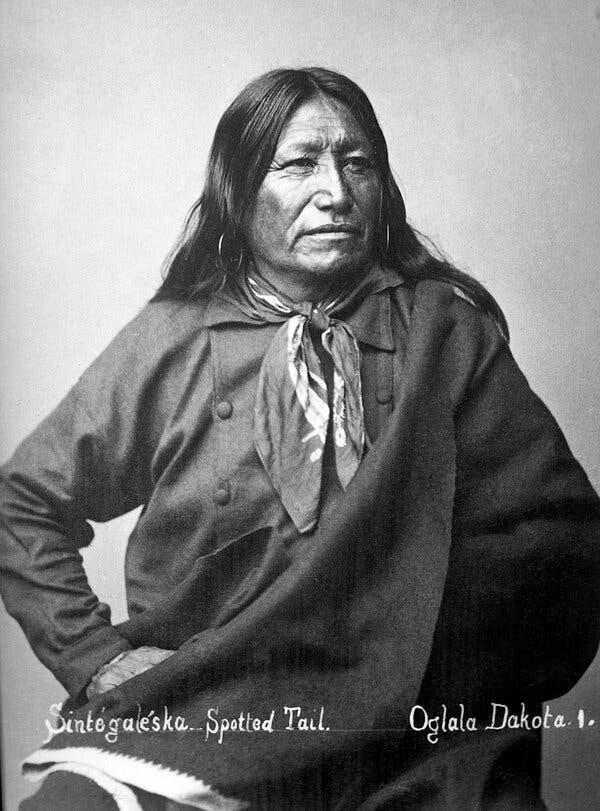|
This 1800s Law Helps Shape Criminal Justice in Indian Country: And that’s a problem—especially for Native American women, especially in rape cases
By David Heska Wanbli Weiden
There was something of a scramble, after the Supreme Court ruled in McGirt v. Oklahoma that much of Eastern Oklahoma was now officially Indian Country. Under the doctrine of tribal sovereignty, the state of Oklahoma could no longer prosecute serious felony cases involving Native Americans on reservation land. But there was little clarity about other critical jurisdictional questions. Shortly after the McGirt decision was handed down, the Oklahoma attorney general and five Native nations in Oklahoma agreed that the state would continue to prosecute crimes committed by non-Native Americans on reservation lands. Tribal authorities would possess joint jurisdiction over Native offenders for most crimes. For the most serious offenses, the federal authorities would prevail, prosecuting Native citizens for serious felonies under the federal Major Crimes Act. But relying on this law, enacted in 1885, could create its own problems, especially for Native American women. And especially in rape cases. The Major Crimes Act gives the federal government exclusive criminal jurisdiction — investigation, trial and corrections — for major felony crimes that occur on Native American reservations. Congress passed the law after the murder of a well-known Native leader from my own nation, the Rosebud Sioux Tribe. In that case, Chief Spotted Tail was assassinated by one of his own people, Crow Dog, for reasons that are not clear. Shortly after the murder, tribal elders met and decided upon the restitution — money, goods and horses — that Crow Dog’s family would pay to Spotted Tail’s people. Traditional Lakota law relied heavily upon the principle of restorative justice, and the arrangement satisfied both families. But the Native principle of justice and reparations offended many American lawmakers, who held radically different views on punishment and retribution, and viewed the penalty as being too lenient. So Crow Dog was arrested by state police, charged with murder in federal court and sentenced to death by hanging. But Crow Dog’s lawyer petitioned the United States Supreme Court, which ruled that the federal government had no right to intervene in an Indian nation’s criminal affairs absent an act of Congress. Crow Dog was freed. But Congress passed the Major Crimes Act, thus ensuring American Indians would never again have the authority to decide the outcome of any serious felony case. But that hasn’t helped Native Americans. Today, crime rates on reservations are much higher than average for nearly every serious offense, in part because of the Major Crimes Act. Because of the jurisdictional complexity of prosecuting these cases, criminal justice enforcement on many reservations is too often disorganized and disordered. Is the victim a Native American? What about the offender? Did the crime take place on Native territory? If a serious felony crime is committed on a reservation by a Native person, the state or tribal police are obligated to refer the case to the F.B.I. or another federal agency. If the agency accepts the referral, it conducts the investigation and makes a recommendation to federal prosecutors for trial in federal court. But here’s the problem: Federal authorities have the right to decline prosecutions in serious felony crimes on Native lands, even when the perpetrator has been arrested. And they frequently do. And, at that point, the offender is usually set free. Although the percentages vary from year to year, federal officials frequently refuse to prosecute murders, assaults and sex crimes referred from tribal or state police departments. In 2018, 39 percent of all referred crimes were declined, and over a quarter of those cases were sexual assaults against children and adults. Why are federal authorities declining to prosecute serious crimes occurring in Native territories? The most typical reasons are, reportedly, insufficient evidence, failure to meet the statutory definition of a crime or failure to satisfy the prosecution guidelines of the U.S. Attorney’s Office. Whatever the reasons, the reluctance to prosecute certain felony crimes on reservations is well known in Indian Country, and it has led to a virtual open season on Native women. The Justice Department reports that one in three Native women will be raped, and the actual figure is likely much higher. Furthermore, tribal courts are generally powerless to prosecute non-Native offenders. When amended in 2013, the Violence Against Women Act did expand the authority of Native nations to prosecute non-Native sex offenders, but few Native nations have the resources to implement the program. As of 2019, fewer than 30 reservations have successfully done so. Because of these issues, crime is high on many Native lands. This Court decision is unlikely to make things better. It’s certainly possible that Native Americans previously prosecuted and convicted in state courts will challenge their convictions and seek new trials in the federal system. It’s also possible that federal authorities will be overwhelmed by the new influx of cases. In light of the McGirt decision, it may be time for Congress to re-examine the Major Crimes Act and determine whether it truly serves Indigenous people. Returning authority in criminal matters to Native nations would further the goal of tribal self-determination as well as improve public safety and strengthen these communities.
|
.
Any original material on these pages is copyright © BishopAccountability.org 2004. Reproduce freely with attribution.
